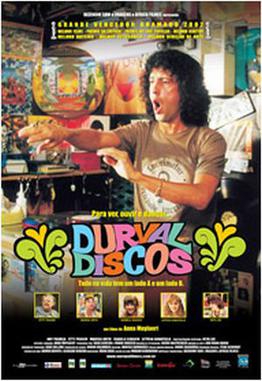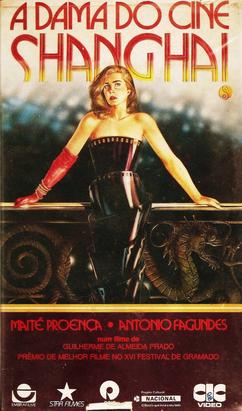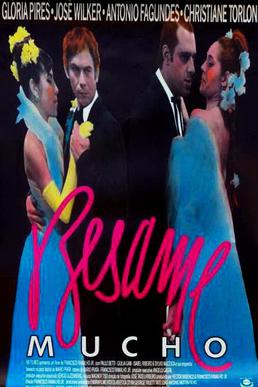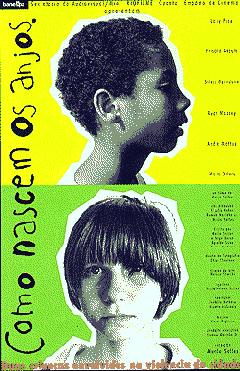
Fernanda Pinheiro Monteiro Torres is a Brazilian screen and stage actress and writer, known for both her comedic and dramatic roles in Brazil. Born in Rio de Janeiro to parents Fernando Torres and Academy Award-nominated and Emmy Award-winning actress Fernanda Montenegro, she grew up immersed in the world of art and performance. Torres has achieved critical acclaim for her work across film, television, theater, and literature.

Glória Maria Cláudia Pires de Morais is a Brazilian actress. She is best known for her roles in TV Globo telenovelas such as Dancin' Days, Vale Tudo, Mulheres de Areia and O Rei do Gado. She is also known for starring in films such as Academy Award-nominated O Quatrilho, box-office hit If I Were You and its sequel, and Lula, Son of Brazil, which is the second most expensive Brazilian film of all time, after Nosso Lar.

Durval Discos is a 2002 Brazilian absurdist dark comedy film written and directed by Anna Muylaert shot in Pinheiros, a borough of São Paulo. The film is noticeable for its soundtrack made up of 1970s Brazilian music that reflects the protagonist's taste, as he is himself a hippie, as well as André Abujamra's original score, more present in the film's second, darker half. The shift of mood from the first part to the second was advertised as life's A and B sides, a reference to the film's homage to LPs.

Matheus NachtergaeleOMC is a Brazilian actor, director, and screenwriter. He has starred in numerous Brazilian films, best known for his appearances in the 1997 film Four Days in September and the 2002 film City of God, and is considered one of the most versatile Brazilian actors of his generation.

Roberto Farias was a Brazilian film director, producer and screenwriter. He directed 15 films during his career. His 1982 film Pra Frente, Brasil was entered into the 33rd Berlin International Film Festival. Farias' brother Reginaldo Faria is also a film director and actor.

Andrew "Andrucha" Waddington is a Brazilian film director, producer, and screenwriter.

Xingu is a 2011 Brazilian drama film directed by Cao Hamburger and scripted by him, Elena Soárez and Anna Muylaert. Starring João Miguel, Felipe Camargo and Caio Blat, the film tells the Villas-Bôas brothers trajectory from the moment in which they joined the Roncador-Xingu expedition, part of the Westward March of Getúlio Vargas, in 1943.
The 2nd Grande Prêmio Cinema Brasil ceremony, presented by the Ministry of Culture of Brazil, honored the best audiovisual productions of 2000 and took place on February 10, 2001, at the Palácio Quitandinha in the city of Petrópolis, Rio de Janeiro beginning at 8:30 p.m. BRT. During the ceremony, the Ministry of Culture presented the Grande Prêmio Cinema Brasil in 18 categories. The ceremony, televised by TV Cultura and Televisão Educativa, was directed by Bia Lessa and hosted by stylist Felipe Veloso.

Por Trás do Pano is a 1999 Brazilian comedy-drama film directed by Luiz Villaça. It stars Denise Fraga, Pedro Cardoso, Luís Melo, Ester Góes and Marisa Orth. The plot follows the story of Helena (Fraga), an insecure actress who is married to Marcos (Cardoso), as she receives an invitation to perform in a play alongside the famous actor Sérgio (Melo), who lives a conjugal crisis with his wife Laís (Orth) due to his involvement with his former wife Alexandra (Góes).

The Lady from the Shanghai Cinema is a 1988 Brazilian thriller film written and directed by Guilherme de Almeida Prado. The film borrows some references from Hollywood films noirs of the 1940s, mainly Orson Welles' The Lady from Shanghai; its name is a play on the title of Welles's film.

Antônio Abujamra was a Brazilian theatre and television director and actor. Having majored in journalism and philosophy at the Pontifícia Universidade Católica do Rio Grande do Sul in 1957, he started a career as a theatre critic while he directed and acted in his own plays at the university theatre. Professionally, he made his debut as a theatre director in 1961, and as an actor in 1987, acting in both theatre and television. In 1989, he gained national fame for his role as Ravengar in Rede Globo's telenovela Que Rei Sou Eu?, which became his best known role. In that same year, Abujamra won the Best Actor award at the Gramado Film Festival for his role in the film Festa. From 2000 onward, he was the presenter on TV Cultura's interview program Provocações. His son André Abujamra is a score composer, while his niece Clarisse Abujamra, is also an actress.

Besame Mucho is a 1987 Brazilian romance drama film directed by Francisco Ramalho Jr., based on the play of the same name by Mário Prata.

How Angels Are Born is a 1996 Brazilian crime drama film directed by Murilo Salles. It stars Priscila Assum and Silvio Guindane as two Rio de Janeiro favela's children who become involved in the kidnapping of an American man played by Larry Pine. How Angels Are Born has received awards at film festivals, and has been well received by critics.

Something in the Air is a 2002 Brazilian drama film directed by Helvécio Ratton. It is based on the actual history about Rádio Favela, a community radio broadcaster established in Aglomerado da Serra, a favela of Belo Horizonte in the 1980s. It shows how it was persecuted by the police while four friends try to keep the radio. Alexandre Moreno, Adolfo Moura, Babu Santana and Benjamim Abras were chosen to star the film after 3,000 people tried for their roles. It was shot in Aglomerado da Serra and used about 300 of the local people as extras.

The Second Mother is a 2015 Brazilian drama film written and directed by Anna Muylaert. The film stars Regina Casé as Val, the housemaid of a wealthy family in São Paulo, and portrays the tensions that arise after her daughter Jéssica moves into the family's house in order to apply for an admission exam at the University of São Paulo.

Lucio Flavio is a 1977 Brazilian film directed by Héctor Babenco based on the book of the same name by José Louzeiro, who co-wrote the screenplay. It stars Reginaldo Faria as Lúcio Flávio, a famous bandit in Rio de Janeiro in the 1970s. Babenco did not want to limit the story to Lúcio Flávio, and stated it was also a film about Esquadrão da Morte, a death squad from the 1960s.

Juliana Rojas is a Brazilian filmmaker and editor born in Campinas, São Paulo. She graduated in Cinema in School of Communication and Arts of University of São Paulo.
Nome Próprio is a 2008 Brazilian film directed by Murilo Salles. The film won three awards at the Gramado Film Festival, including Best Picture and Best Actress.
É Proibido Fumar is a 2009 Brazilian film written and directed by Anna Muylaert. It stars Glória Pires and Paulo Miklos.
The Best Mother in the World is an upcoming drama film directed by Anna Muylaert. The film is about a hard-working mother who fights for the safety of her young children.
















